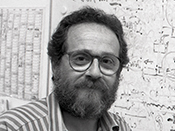Riccardo Cortese, former Head of Unit, passed away on 27 April 2017 in Basel aged 73.
Riccardo Cortese, a great scientist and innovator, passed away on 27 April 2017 in Basel at the age of 73, after a long struggle with an incurable, metastatic cancer. Riccardo was born in Siena in 1944 and graduated in Medicine at the University of Naples Federico II. Already during his Medical studies at the University of Naples Federico II he started to pursue his scientific curiosity away from Italy, with a short research experience at the Pasteur Institute in Paris. During that visit he met Karen, who would shortly thereafter become his wife. Karen and Riccardo have two children and four grandchildren. Shortly after obtaining his degree in Medicine, Riccardo joined Bruce Ames’ lab in Berkeley, as a PhD student, studying transcriptional regulation and RNA post-translational modification in bacteria. In 1973 he went back to Naples as Associate Professor but shortly after he moved again to the MRC Laboratory of Molecular Biology in Cambridge with an EMBO fellowship.
In Cambridge, he became acquainted with leading figures in Molecular Biology such as Max Perutz, John Gurdon and Fred Sanger. Above all, he always spoke with great admiration and respect for Sydney Brenner, with whom he particularly liked to engage in conversations about science. It was at the MRC that Riccardo switched to eukaryotic systems, studying the maturation of tRNAs by injection of the corresponding genes in Xenopus oocytes. Among his collaborators and friends of the times were Eddy De Robertis and Doug Melton. In 1979 Riccardo was recruited as a group leader at the EMBL-Heidelberg, were he was subsequently asked to set up and coordinate the Gene Expression programme. Riccardo built an exciting programme recruiting Iain Mattaj, Henk Stunnenberg, Roberto Di Lauro, Angus Lamond, David Tollervey and Matthias Hentze. In this period, Riccardo published many seminal papers, first on the transcriptional regulation of RNA polymerase III-transcribed genes and subsequently on liver-specific gene expression. To obtain liver-enriched cDNAs to help clone the genes, he undertook what was probably the first ever genomic-scale DNA sequencing experiment.
In 1989 Riccardo was contacted by Merck to build a first-class research laboratory in Italy and one year later he left EMBL to establish and direct the Istituto di Ricerche di Biologia Molecolare P. Angeletti (IRBM) in Pomezia, where he remained till 2006. At the IRBM Riccardo again attracted outstanding scientists and created an internationally renowned research centre with up to 300 employees. IRBM research was aimed towards the development of drugs and vaccines. Riccardo was fond of phage libraries that he used to isolate peptides for diagnostic and vaccination purposes. His great intuition was also the use the information derived from inhibitors of Hepatitis C virus (HCV) to generate novel inhibitors of HIV integrase, that led to the synthesis of Isentress™, the first anti-integrase of HIV to reach the market. In the last period at IRBM Riccardo generated the idea of establishing a new approach to vaccines based on adenoviral vectors.
This latter became the founding idea of Okairos, a company that he established on leaving the IRBM and becoming a successful independent entrepreneur. With Okairos, Riccardo made outstanding contributions, building a pipelines of vaccines against HCV, Malaria, RSV and Ebola. The success of Okairos led Riccardo to establish two new companies, ReiThera and Nouscom, the latter dedicated entirely to the generation of anti-cancer vaccines. Unfortunately, Riccardo was unable to benefit from the new therapies that Nouscom was generating, as the cancer defeated him too soon. This brief account illustrates the energy, the enthusiasm and the enormous intelligence and creativity of Riccardo. He was capable of spanning from basic science to the application of knowledge to solve important medical problems and to very successful entrepreneurship. In addition to science, medicine and business, Riccardo was a man of great culture, interested in history, philosophy and politics. He was able to make intelligent contributions to discussions on a great variety of topics, driven by extreme curiosity and unusual intelligence. But Riccardo’s trajectory also illustrates what will be his lasting legacy. Riccardo created opportunities, and the number of people that benefitted from them is countless. He was a teacher for all those that crossed his path, in the best tradition of a real “Professor” of science and life. The regret for those that knew him is that most of us did not have a chance to say: “We love you”.
by Roberto di Lauro and Gennaro Ciliberto
